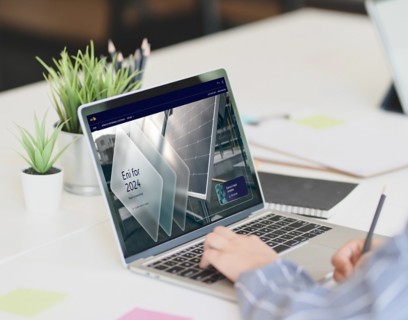
Or , our new artificial intelligence tool.
MyEni Login
- COMPANY
Decarbonising maritime transport
We work with the supply chain on sustainable solutions: cutting the impact from the maritime sector is essential to progress towards Net Zero.

Maritime transport and the global decarbonisation challenge
Maritime transport is the backbone of the economy: in Europe, it accounts for 75% of extra-EU trade and 36% of intra-EU trade. At the same time, both the IMO (International Maritime Organisation) and the European Union have set strict decarbonisation targets. The EU requires a gradual reduction in the greenhouse gas intensity of fuels, starting with a 2% cut in 2025 and reaching up to 80% by 2050. These targets call for swift action on fleets, fuels, infrastructure and business models. The complexity of this transformation demands a scenario-based approach and broad cooperation among all stakeholders.
An integrated and technology-neutral approach
The wide range of energy carriers currently being explored - including drop-in biofuels (compatible with existing infrastructure, such as HVO), bio-LNG, methanol, ammonia, hydrogen and synthetic fuels - reflects varying levels of technological maturity, feedstock availability and infrastructure requirements. The principle of technological neutrality we adopt allows us to assess each option based on its lifecycle environmental performance, total cost and compatibility with existing infrastructure, supporting realistic transition processes for shipowners and ports.
Giuseppe Ricci
Chief Operating Officer Industrial Transformation
Eni’s contribution: scenario analysis to support sustainable solutions
We have launched collaborations with the shipowners’ associations Assarmatori and Confitarma, presenting the paper “The route to Net Zero. Together to decarbonise the maritime sector”, developed with input from marine engine manufacturers and other stakeholders. In addition, in partnership with Fincantieri and RINA, we have expanded the global scenario by analysing technically and economically viable sustainable solutions for maritime transport decarbonisation, with a specific focus on the cruise sector.
From Mediterranean study to the first global outlook
Eni is carrying out analyses and building partnerships through several initiatives.
- Mediterranean Roadmap (July 2023): In collaboration with Assarmatori and Confitarma, we coordinated the work of experts from engine manufacturers, industry associations, and certification bodies. The document "The route to Net Zero" compared twelve energy solutions and identified HVO biofuels and LNG as immediately available levers.
- Global Outlook (April 2025): In partnership with Fincantieri, RINA and Bain & Company, we expanded the analysis globally, segmenting the fleet by type and region, and integrating fuel volume assessments with total cost considerations for shipowners (including vessel capex, opex, carbon price and penalties). The study estimates infrastructure investments in European ports by 2050 and confirms the primary role of biofuels in the short-to-medium term.
Key data from Eni’s studies
-
40experts
involved in the 2023 study
-
3scenarios
of decarbonisation analysed (Net Zero Together; Transition for Leaders, Today as Future)
-
50%new ship orders
focused on alternative fuels (2023)
-
24bln €
estimated port investments by 2050
The future of sustainable maritime transport
As part of their efforts to support the energy transition in the maritime sector, Eni, Fincantieri and RINA are planning to establish a global observatory to explore the medium-to long-term outlook for sustainable decarbonisation solutions in the maritime sector. This process requires a range of solutions, selected case by case according to criteria relating to effectiveness, availability and economic impact. The studies we have coordinated confirm that drop-in biofuels and bio-LNG can deliver immediate emissions reductions, while hydrogen, methanol and ammonia technologies are expected to play a crucial role from 2040 onwards, supported by targeted investments in port infrastructure. A technology-neutral approach, based on partnerships between industry, research and the logistics supply chain, helps build a credible roadmap towards carbon neutrality by 2050.
The studies promoted by Eni
Download the two complementary documents outlining the shipping decarbonisation process.
HVO diesel biofuel for marine transport
Enilive, the Eni company dedicated to mobility products and services, announces that HVO diesel biofuel for marine transport is now available in the ports of Genoa and Ravenna.






















